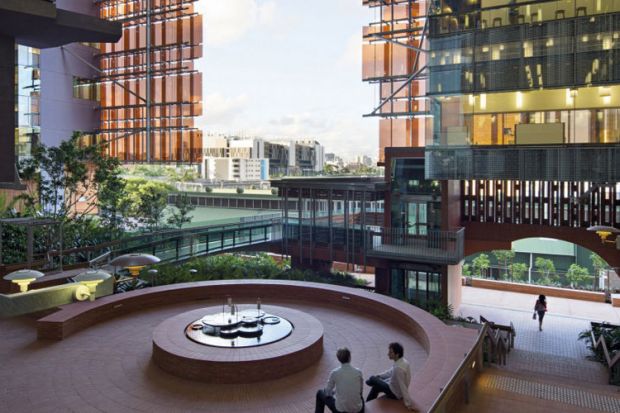Source: TRI
Great minds: TRI will eventually house more than 780 researchers
The chance to lead a ground-breaking bench-to-bedside biomedical research institution on Australia’s sunny north-eastern coast is likely to draw applicants like a whiff of eucalyptus brings koalas.
The Translational Research Institute in Brisbane, which officially opened last October, will eventually house more than 780 researchers drawn from its four founding partner institutions: two of Brisbane’s universities – the University of Queensland and Queensland University of Technology – plus the independent Mater Medical Research Institute and the Princess Alexandra Hospital Centres for Health Research.
According to David Watson, chair of TRI and former Australian parliamentarian, the institute’s combination, on the hospital site, of wet labs, a clinical trials facility and a pharmaceutical manufacturing facility (subcontracted to pharmaceutical company DSM Biologics) was unique in the southern hemisphere and rare in the northern.
Dr Watson said the manufacturing facility was crucial because “big pharma” was largely absent from Australia, meaning the country currently lacks the scale of manufacturing necessary to proceed to stage three clinical trials.
He added that the institute, which was mostly built with grants from state and national government, offered unprecedented opportunities for collaboration and economies of scale among the four partner institutions, as well as the chance for them to win funding they might not have attracted individually. Currently, TRI is about 200 researchers short of capacity. But as expansion continues, the pressure on researcher performance is likely to grow, in line with TRI’s aspiration to be “world class”.
The partner institutions will retain responsibility for hiring and paying staff, but TRI will apply a quality threshold to anyone that wants lab space on its premises and the institute will be, in Dr Watson’s words, “very much driven by performance criteria”.
The development of these criteria – scheduled to be implemented in 2016 – will be one of the major responsibilities of the new chief executive officer and director of research. Candidates must have senior management experience, but Dr Watson said it was not crucial for them to have previously run a research institute.
“The appointee must be able to gain the respect of the leading researchers in TRI; hence a significant research record would be beneficial,” he said.
“However, given the wide scope of the institute’s research areas, it is more of a priority that the successful candidate is able to demonstrate an appreciation for a broad range of clinical and biomedical research fields and, importantly, be respected for the scientific judgements they have made.”
He said the institute was conducting a worldwide search via “selective advertising and personal contacts”. The UK was likely to contain people with the relevant skills, including Australians, “who may see this as an exciting opportunity to return home”.
The appointee will succeed the University of Queensland’s Ian Frazer, who is returning to full-time research.
The closing date for applications is 7 April 2014.
Finding your element: other science roles
University of Dundee
The University of Dundee is looking for a chair in applied health research.
Applications accepted until suitable candidate is found
View the full job description and apply for this role
Durham University
Durham University has a vacancy for a bioinformatics experimental officer in its School of Biological and Biomedical Sciences.
Closing date for applications: 16 March 2014
View the full job description and apply for this role
University of Manchester
The National Graphene Institute at the University of Manchester is searching for a research director.
Applications accepted until suitable candidate is found
View the full job description and apply for this role
Appointments
The University of Huddersfield has appointed Samir S. Dani as professor of logistics and supply chain management. Professor Dani joins from Loughborough University where he was a senior lecturer in operations management.
Guy Poppy has been appointed chief scientific adviser at the Food Standards Agency. Professor Poppy will step down from his role as director of interdisciplinary research at the University of Southampton to take up the role. However, he will continue with his research in global food security at the university.
Alison Chambers will join Bucks New University on 1 April as pro vice-chancellor and executive dean of the Faculty of Society and Health. Dr Chambers is currently dean of academic development and employability at the University of Central Lancashire.
The University of Manchester has appointed Juergen Maier, managing director of Siemens UK and Ireland Industry Sector, as an honorary professor in its Faculty of Engineering and Physical Sciences.
Clare Williams has been appointed dean of research at Brunel University. Professor Williams, currently deputy head (research) at the university’s School of Social Sciences, will work closely with the vice-principal for research, Geoff Rodgers, supporting and implementing the university’s strategies in a range of areas.
University Campus Suffolk has made two appointments to its senior management team. Jill Robinson and Simon Hallsworth have been made executive deans for the Faculty of Health and Science and Faculty of Arts, Business and Applied Social Science, respectively.
Register to continue
Why register?
- Registration is free and only takes a moment
- Once registered, you can read 3 articles a month
- Sign up for our newsletter
Subscribe
Or subscribe for unlimited access to:
- Unlimited access to news, views, insights & reviews
- Digital editions
- Digital access to THE’s university and college rankings analysis
Already registered or a current subscriber?

